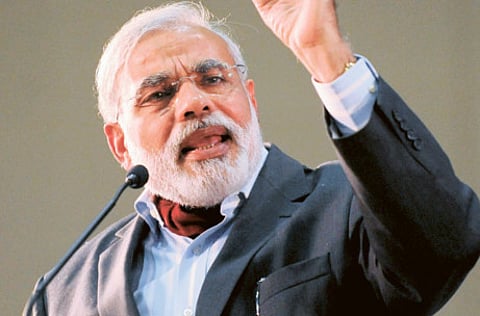Modi and the fear of an unappetising choice
India faces a choice between tolerance and governance

India today is a discontented and politically troubled nation, similar in some ways to Britain in the late 1970s — high inflation, declining growth, big fiscal deficits and a government in denial. Britain yearned for a strong leader then and got one in Margaret Thatcher. Sick of the drift and paralysis in their own government, many Indians have begun to ask if Narendra Modi is the answer to the country’s troubles.
The sudden emergence of the chief minister of Gujarat — a tough, stocky 62-year-old from the Hindu nationalist Bharatiya Janata Party (BJP) — as a serious contender for the nation’s top job has caught people by surprise. He has shown the ability to build a vibrant economy and usher in corruption-free governance in the western state, but can he do it for India? More and more people think he offers the best chance of tackling corruption, ungumming bureaucracy and restoring the economy.
Modi’s Thatcher-like talk of “less government and more governance” certainly resonates with me and with the aspiring young middle class, which is attracted to his fresh political language; he uses words such as “outcomes” and “accountability”. Visit a municipal office, he says, and you will only see clerks. But an urbanising nation needs people with the technical skills to solve sanitation, transport and infrastructure problems. So he hired engineer interns and gave them an opportunity to solve municipal problems in Gujarat.
Implementation is his obsession and he has a good record. Compare the fates of two canals of equal size — the Sujalam Sufalam Yojana, which he completed in two years, with the still incomplete Sardar Sarovar canal, whose foundation stones were laid by Jawaharlal Nehru. This is exactly the kind of failure that has long held India back.
Every country must protect its environment, but rather than insisting on endless delays in the name of conservation, Modi has covered 19,000km of Gujarat’s canals with solar panels. They prevent water from evaporating, conserving water and land and making his state a leader in solar power.
India’s middle classes have never been a significant factor in elections; they seldom vote and they do not have much of a voice in politics. So he is bound to fail, his rivals say. But they forget that, since 1991, a young aspiring generation has risen into the middle class through grit, struggle and the mobile phone. Many have migrated from villages — Modi calls them “neo-middle classes” — and they could make up more than a third of the country. They find the contrast galling between their lives of hard work and the lives of those in power who have risen through corruption. They are enraged by violence against women and children and long for a leader who is tough on crime. In Modi, they may have found a voice. They see in him an underdog, a David challenging the Goliath of the Nehru-Gandhi dynasty.
These are tempting thoughts for a middle-of-the-road Indian — someone like me.
However, Modi has a clear downside: He is dictatorial and one fears that his nationalism may poison relations with the Muslim minority. I, and many others in the middle class, consider Modi to be anti-Muslim and cannot forgive him for the intra-communal violence that erupted in Gujarat in 2002.
He may not have actively connived in it, but he does not show remorse, even though the violence happened on his watch. By polarising the country, I fear he may alienate India’s Muslims, potentially raising the risk of domestic terror. So far, the Muslim minority has been relatively moderate and less Islamist. The temptation to vote for prosperity and good governance must be tempered by the imperative to keep the nation united and secular.
I also do not find Modi particularly likeable. Rahul Gandhi — the scion of the Nehru-Gandhi dynasty, emerging as de facto leader of the Congress party — is far more affable but, like many Indians, I seek an effective leader rather than a friendly one. My dilemma — and the nation’s — is that Modi is the most likely candidate to provide good governance, restore the economy to high growth, create masses of jobs and lift millions into the middle class. Like Thatcher, he is the person most likely to transform the country into a middle-class nation. These are very considerable strengths. But I also believe that India’s secularism, pluralism and tolerant temper are as precious as its prosperity. And so I am torn between two sets of values that are equally important to me.
I would have preferred a secular Modi, obviously, but in the end I will have to choose between imperfect candidates in 2014 and be forced to make a trade-off. By rejecting him and choosing secularism over development, I might help deprive millions of young men and women from rising above their lot and realising their capabilities — no small decision. Yet, by choosing him, I would be compromising on the idea of a plural, tolerant and diverse nation that is at the heart of my “idea of India”. It is an unappetising choice.
— Financial Times
Gurcharan Das is the author of India Grows at Night: A Liberal Case for a Strong State.
Sign up for the Daily Briefing
Get the latest news and updates straight to your inbox



